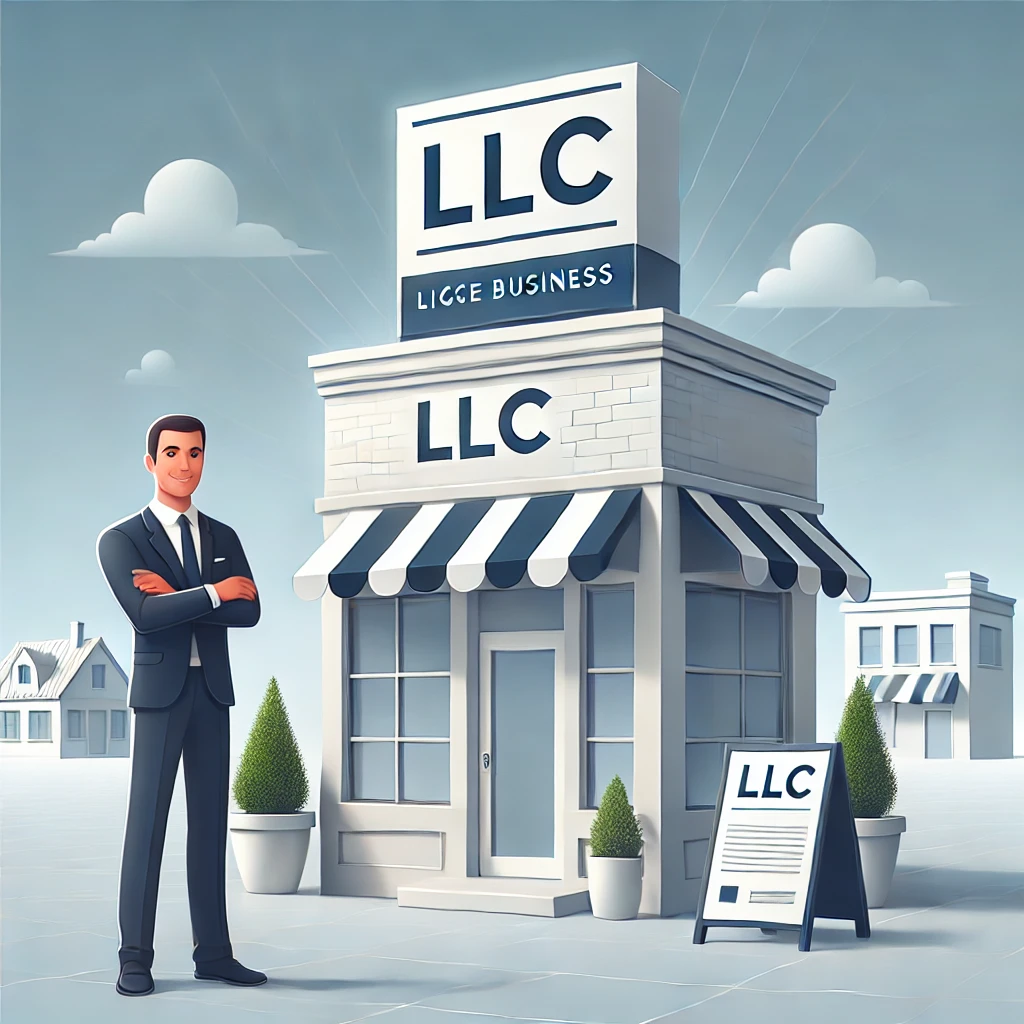LLCs for Small Business: A Comprehensive Guide
Introduction to LLCs for Small Business
Starting a small business ( LLCs for Small Business ) involves numerous decisions, and one of the most crucial is choosing the right legal structure. One popular option for entrepreneurs is the Limited Liability Company, or LLC. But why is this business structure so appealing to small business owners?
What is an LLC?
A Limited Liability Company (LLC) is a hybrid business entity that combines the features of a corporation with those of a partnership or sole proprietorship. It provides limited liability protection for its owners (called members) while offering flexible tax and management options. This makes it a great choice for many small businesses looking to protect personal assets without complicated corporate regulations.
Why Choose an LLC for Small Business?
LLCs are particularly well-suited for small business owners due to their simplicity, flexibility, and strong protection of personal assets. Whether you’re a freelancer, small business owner, or running a side gig, an LLC can help safeguard your personal wealth while allowing you to focus on growing your business.
Understanding the Structure of an LLC
LLC vs. Other Business Structures
An LLC differs from other business structures like sole proprietorships, partnerships, and corporations. Sole proprietorships and partnerships offer no protection for personal assets, while corporations have more rigid structures. An LLC provides a middle ground by offering limited liability without the formalities of a corporation.
How Does an LLC Protect Personal Assets?
The primary advantage of an LLC is that it shields its members from personal liability for business debts or lawsuits. This means that if your business faces legal action or financial difficulties, your personal assets—like your home or savings—are generally safe.
Benefits of Forming an LLC
Tax Flexibility
One of the biggest perks of forming an LLC is the flexibility in how it is taxed. By default, LLCs benefit from “pass-through” taxation, meaning the business’s income and expenses are passed directly through to the members’ personal tax returns. This avoids double taxation, a common issue with corporations.
Limited Liability Protection
As mentioned earlier, an LLC protects your personal assets from business liabilities. This is critical, especially for small business owners who might face legal challenges or financial setbacks in the early stages of their business.
Ease of Management
Unlike corporations, which require a board of directors, regular meetings, and minutes, an LLC offers a more relaxed management structure. Owners can run the business themselves or appoint managers to handle operations without a lot of red tape.
Steps to Form an LLC
Choosing a Name for Your LLC
The first step in forming an LLC is selecting a unique name for your business. Make sure it complies with state regulations and doesn’t infringe on any existing trademarks.
Filing Articles of Organization
Once you’ve chosen a name, the next step is filing the Articles of Organization with your state’s business office. This document officially establishes your LLC and includes basic details like the name, address, and members of the company.
Obtaining an EIN (Employer Identification Number)
After filing the necessary paperwork, you’ll need to apply for an EIN from the IRS. This number is essentially your LLC’s Social Security number, and you’ll use it when filing taxes or hiring employees.
Operating Agreements for LLCs
What is an Operating Agreement?
An Operating Agreement outlines the internal operations of your LLC, including ownership structure, management duties, and how profits and losses are distributed. While not required in every state, it’s highly recommended for both single-member and multi-member LLCs.
Importance of an Operating Agreement
Having an Operating Agreement helps prevent disputes among members and provides a clear roadmap for running the business. It’s particularly important in multi-member LLCs where roles and responsibilities might otherwise be unclear.
Tax Considerations for LLCs
How LLCs are Taxed
LLCs have the flexibility to choose how they want to be taxed—either as a sole proprietorship, partnership, or corporation. Most small LLCs opt for pass-through taxation, which means that the business doesn’t pay taxes at the corporate level. Instead, profits and losses are reported on individual tax returns.
Pros and Cons of Pass-Through Taxation
Pass-through taxation simplifies tax filing but may result in higher self-employment taxes for LLC members. Owners of LLCs must pay self-employment taxes, which cover Social Security and Medicare, on their share of the profits.
Self-Employment Taxes for LLC Members
Members of LLCs are responsible for paying self-employment taxes on their share of the business’s income. This can be a financial consideration when deciding if an LLC is the right structure for your small business.
Read More, How to Start an LLC in 7 Steps (with Facts & Figures)
LLC Compliance Requirements
Annual Reporting and Fees
Most states require LLCs to file annual reports and pay ongoing fees to maintain good standing. The exact requirements vary by state, so it’s essential to stay informed and meet deadlines to avoid penalties.
Keeping Business and Personal Finances Separate
To maintain the protection of your personal assets, it’s crucial to keep your business and personal finances separate. This means opening a business bank account and keeping meticulous records of business expenses.
Choosing Between Single-Member and Multi-Member LLCs
Differences in Management and Taxation
Single-member LLCs are easier to manage and have simpler tax filing requirements. Multi-member LLCs, on the other hand, offer the ability to distribute profits and losses among members but require more complex documentation.
When to Consider a Multi-Member LLC
A multi-member LLC may be the right choice if you’re starting a business with partners and want to clearly define each person’s role and share of the business. It also provides flexibility in how the company is managed.
LLCs and Business Expansion
How LLCs Facilitate Business Growth
LLCs provide a solid foundation for future growth by offering the flexibility to bring in new members, change management structures, or convert to a corporation if necessary.
Converting from an LLC to a Corporation
As your business grows, you may consider converting from an LLC to a corporation. This can provide additional benefits, such as the ability to issue stock, but it comes with added complexities.
State-Specific LLC Regulations
How Regulations Vary by State
Each state has different rules for forming and maintaining LLCs, so it’s important to understand the specific regulations in your state. Some states have lower filing fees or more favorable tax laws for small business owners.
Understanding Your State’s LLC Laws
Researching your state’s LLC requirements ensures you comply with local laws and take advantage of any benefits your state may offer.
LLCs for Home-Based Businesses
Why Home-Based Businesses Benefit from LLCs
If you’re running a home-based business, forming an LLC can provide legal protection while maintaining a simple operational structure. It’s an excellent way to legitimize your business and separate your personal and professional finances.
Legal Considerations for Home-Based LLCs
Even if you operate from home, it’s important to follow local zoning laws, acquire the necessary permits, and maintain liability protection by forming an LLC.
Costs of Forming and Maintaining an LLC
Startup Costs
Forming an LLC typically involves filing fees, which vary by state. You may also incur costs if you hire a professional to help with the paperwork or need a registered agent to receive legal documents.
Ongoing Maintenance Fees
In addition to startup costs, LLCs often have annual fees and requirements, such as filing an annual report. These fees vary but are a small price to pay for the legal protections an LLC offers.
Common Misconceptions About LLCs
LLCs and Personal Liability
A common misconception is that forming an LLC completely shields you from all personal liability. While an LLC does provide significant protection, it’s not foolproof. You still need to maintain proper business practices to avoid “piercing the corporate veil.”
LLCs and Business Credit
Another misconception is that an LLC automatically builds business credit. In reality, you’ll need to establish a business credit history by working with vendors and creditors and ensuring you meet all financial obligations.
Hiring Employees in an LLC
Employment Laws for LLCs
Once you begin hiring employees, your LLC will be subject to various employment laws, including worker’s compensation, minimum wage requirements, and anti-discrimination regulations.
Benefits of Hiring Through an LLC
Hiring through an LLC provides legal protections and allows you to easily manage payroll, taxes, and employee benefits. It also enhances the credibility of your business in the eyes of potential employees.
Conclusion
LLCs offer a flexible, affordable, and legally sound option for small business owners looking to protect their personal assets and grow their companies. Whether you’re starting a side hustle, home-based business, or scaling up, forming an LLC provides essential protections and benefits.
LLCs for Small Business, LLCs for Small Business, LLCs for Small Business, LLCs for Small Business, LLCs for Small Business, LLCs for Small Business, LLCs for Small Business, LLCs for Small Business, LLCs for Small Business, LLCs for Small Business,







